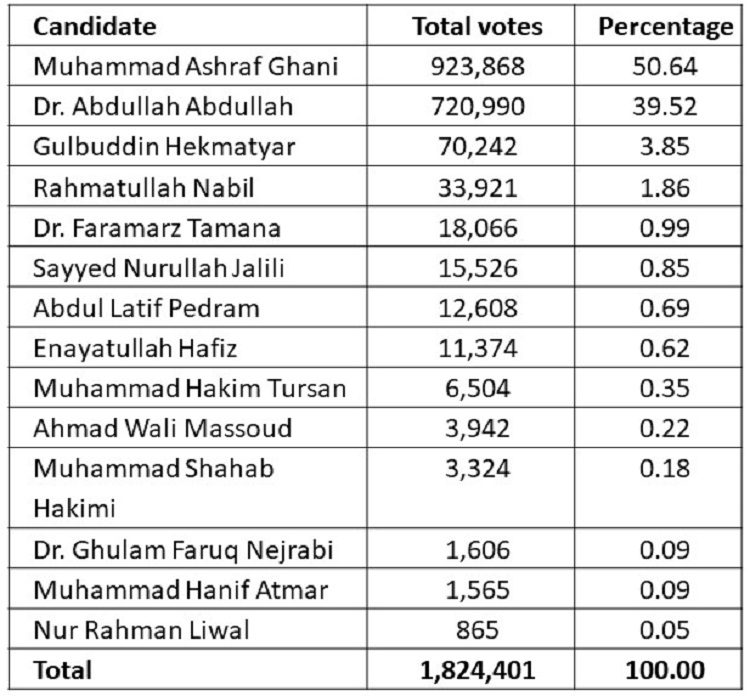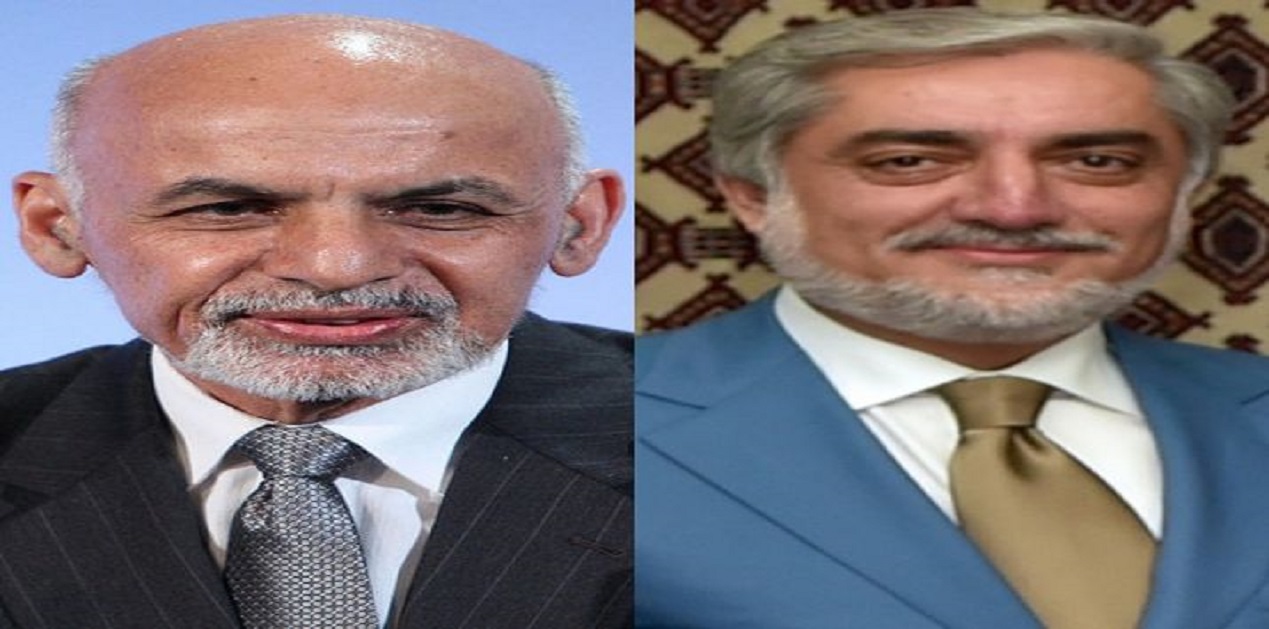Afghanistan’s Independent Election Commission (IEC) has finally announced the preliminary results of the Presidential elections held in Afghanistan on 28 September 2019. The results, though not final, gave a thin majority to the incumbent President Ashraf Ghani with a total of 923,868 votes (50.64%) out of the 1,824,401 votes counted by the IEC. President Ghani’s team has crossed the threshold of above 50% votes share necessary to avoid a runoff election.1 However, it is only by a thin margin of fewer than 12,000 votes that President Ghani has escaped a runoff election. Article 61 of the Constitution of Afghanistan states that to be elected as a President of the country, the candidate must receive more than 50 percent of the votes in Presidential elections. It also adds that “if in the first round none of the candidates gets more than 50 percent of the votes, elections for the second round shall be held within two weeks from the date election results are proclaimed, and, in this round, only two candidates who have received the highest number of votes in the first round shall participate.”2 In the preliminary results, Chief Executive Dr. Abdullah has received the second-highest vote share with 39.52% of the votes, and the Hizb-e-Islami leader, Gulbuddin Hekmatyar, secured third place with 3.85% of votes.3
Table 1: Presidential Election Preliminary Result

The results which were initially planned to be announced on October 19 have been repeatedly postponed due to technical issues, recounting of votes, fraud allegations, and protests by the opposition candidates. After the announcement of preliminary results by the IEC, the Stability and convergence campaign team led by Dr. Abdullah said: “the preliminary results were announced without separating the clean and fraudulent votes from each other.”5 Meanwhile, the Council of Presidential candidates which included 13 out of 18 Presidential candidates also stated that they do not accept the preliminary results as valid, and stressed on the establishment of the ‘National participation government’ in order to end the ongoing stalemate.6 On the other hand, President Ghani has welcomed the preliminary results and asked the opposition candidates to “accept the principles of the game.”7
Article 91 of the Electoral law allows the candidates to register their objections with the Electoral Complaints Commission (ECC) within three days after the announcement of the preliminary results.8 The Independent Electoral Complaints Commission (IECC) has already registered over 16,200 complaints since the declaration of preliminary results.9 The law gives provincial ECC to adjudicate the complaints within 15 days. In case, the candidate finds the decision of the provincial ECC unsatisfactory, they can challenge it in central ECC within three days. It is the onus of the central ECC to adjudicate these complaints within 15 days.10 In short, it will take approximately 35-39 working days for the review process to be completed. Since the margin of votes by which President Ghani has avoided a runoff is fewer than 12,000 votes, there is a high probability that after the review process his share of votes may come down and the election will go into a runoff.11
It is interesting to note that out of the 34 provinces of Afghanistan, Abdullah Abdullah got the highest votes in 18 provinces of northern and central highlands. On the other hand, President Ghani won 16 provinces in the southern and eastern Afghanistan.12 Such a clear and deep division of the country along the ethnic lines is not new for the observers of politics in Afghanistan. However, it suggests that in this scenario any government which comes to power “would remain weak; accommodate tribes, warlords, political and ethnic interest groups; and ignore enduring malpractices in Afghanistan’s bureaucracy.”13 Moreover, without a strong leader who is supported by all the ethnic groups in Afghanistan, the country will not be able to present a united front against the Taliban in case any future intra-Afghan negotiation begins. According to certain sources, the Taliban has already reached an understanding among themselves on the issue of a temporary ceasefire. It is likely that the armed group will announce a 10-day ceasefire as soon as the US-Taliban peace deal is signed, following which the intra-Afghan talks may begin.14
Further, the reaction from the United States on the announcement of preliminary results was not of a complete approval but rather of cautiousness regarding the challenges before the final declaration of results. In this regard, the US ambassador to Afghanistan, John R. Bass has already cautioned the people of Afghanistan that the declaration of preliminary results doesn’t mean the end of the electoral process and “many steps remain before final election results are certified, to ensure the Afghan people have confidence in the results.” Moreover, recognizing that IEC counted 1.82 million votes which represent 20 percent of the 9.7 million registered voters and around 12 percent of total population of 15 million in voting age, the US Principal Deputy Assistant Secretary of State for South and Central Asia, Alice Wells also exhorted that since “the majority of Afghans were not able to vote, the eventual winner whomever that is, must take early and concrete steps to ensure the country’s rich diversity is well reflected in its leadership and negotiating team.” 15
Since the entire focus of the US administration remains on withdrawing troops from Afghanistan, the US may refrain from endorsing any candidate as the winner in case of a future stalemate. If there is no clear outcome or the stalemate prolongs, there is a likelihood that the US may use the abandonment of the electoral process as a bargaining chip in order to move ahead on the peace deal with the Taliban. In any case, the Taliban is averse to accepting any government in Afghanistan which doesn’t ensure its presence in the power structures. However, the US Defence Secretary, Mark Esper has already hinted at the impatience within the Trump administration regarding the peace deal with the Taliban when he said that “he wants to reduce the number of US troops in Afghanistan with or without a peace agreement.”16 In this case, if the US forces leave without signing a peace deal then they will lose all the leverage to bring the Taliban at the negotiating table and the country may move towards civil war. Therefore, at this juncture, whether the US moves ahead with the peace deal or withdraws its forces without any deal, it is imperative for the Afghans to rise above the deep ethnic divisions and forge a strong government in Kabul in order to deal with future challenges. In this background, the importance of the Presidential elections of 2019 cannot be stressed enough since it can lead the country either towards more chaos or could pave the way for a stable and peaceful future.
Meanwhile, the international community including the United Nations Assistance Mission in Afghanistan (UNAMA) has welcomed the announcement of the preliminary results and stressed that “all candidates have the chance to raise any concerns they may have through the appropriate mechanism and within the prescribed time, in accordance with the relevant legal frameworks, regulations, and procedures.”17 India has also applauded the announcement of the Preliminary results and the hard work done by the leaders and institution of Afghanistan to strengthen the democracy in the country. India also hoped that the complaints will be addressed “through a prescribed legal process so that the final results are declared in a timely manner.”18 As a time-tested friend of Afghanistan, “India remains committed to working with the people and Government of Afghanistan in its fight against terrorism and in its pursuit of socio-economic development.”19 However, it is up to the people and leaders of Afghanistan to decide the trajectory of their country. The prevalent ethnic division and mistrust among the political elites will eventually push the country towards more chaos.
References
- Ghani Tops Preliminary Election Results: IEC, TOLO News, 22 December 2019, URL: https://tolonews.com/afghanistan/ghani-tops-preliminary-election-results-iec
- Ministry of Foreign Affairs, Afghanistan, URL: https://www.mfa.gov.af/constitution/chapter-three-president.html
- Ibid
- Independent Election Commission, Afghanistan, URL: http://www.iec.org.af/results/en/home/priliminary_votes; Also see, http://www.iec.org.af/results/en
- Abdullah’s Team Calls Election Results ‘Fraudulent’, TOLO News, 22 December 2019, URL: https://tolonews.com/elections-2019/abdullah%E2%80%99s-team-calls-election-results-%E2%80%98fraudulent%E2%80%99
- Ibid
- Ghani: “Today a Republic Was Ensured”, TOLO News, 22 December 2019, URL: https://tolonews.com/afghanistan/ghani-%E2%80%9Ctoday-republic-was-ensured%E2%80%9D
- Election Law of Afghanistan, URL: http://www.iec.org.af/pdf/legalframework/law/electorallaw_eng.pdf
- IECC Registers 16,200 Complaints: Officials, TOLO News, 25 December 2019, URL: https://tolonews.com/index.php/elections-2019/iecc-registers-16200%C2%A0complaints-officials
- Election Law of Afghanistan, URL: http://www.iec.org.af/pdf/legalframework/law/electorallaw_eng.pdf
- Afghan election runoff likely amid thousands of complaints: officials, Reuters, 23 December 2019, URL: https://www.reuters.com/article/us-afghanistan-election/afghan-election-runoff-likely-amid-thousands-of-complaints-officials-idUSKBN1YR145
- Independent Election Commission, URL: http://www.iec.org.af/results/en/home
- Umair Jamal, The High Price of Afghanistan’s Disputed 2019 Presidential Election, The Diplomat, 24 December 2019, URL: https://thediplomat.com/2019/12/the-high-price-of-afghanistans-disputed-2019-presidential-election/
- Taliban Leaders Considering Temporary Ceasefire: Source, TOLO News, 25 December 2019, URL: https://tolonews.com/index.php/afghanistan/taliban-leaders-considering-temporary-ceasefire-source
- Twitter, 22 December 2019, URL: https://twitter.com/State_SCA/status/1208762775868190720
- Esper: US troops can withdraw 'with or without' Afghan peace deal, Al Jazeera, 17 December 2019, URL: https://www.aljazeera.com/news/2019/12/esper-troops-drawdown-afghan-peace-deal-191217054412919.html
- United Nations statement on the announcement of preliminary results for Afghanistan’s Presidential elections, UNAMA, 22 December 2019, URL: https://unama.unmissions.org/united-nations-statement-announcement-preliminary-results-afghanistan%E2%80%99s-presidential-election
- Official Spokesperson's response to a query on Afghan Presidential elections, MEA, 23 December 2019, URL: https://www.mea.gov.in/response-to-queries.htm?dtl/32235/Official+Spokespersons+response+to+a+query+on+Afghan+Presidential+elections
- Ibid
(The paper is the author’s individual scholastic articulation. The author certifies that the article/paper is original in content, unpublished and it has not been submitted for publication/web upload elsewhere, and that the facts and figures quoted are duly referenced, as needed, and are believed to be correct). (The paper does not necessarily represent the organisational stance... More >>
Image Source: https://resize.indiatvnews.com/en/resize/newbucket/715_-/2019/12/pjimage-9-1577099003.jpg











Post new comment